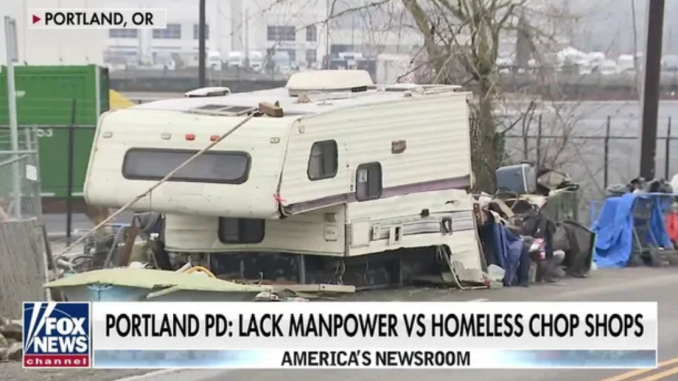
Federal employees demanded Portland City Council address a homeless encampment outside their office that they say has created safety concerns, cost the agency hundreds of thousands in security measures and become “an existential threat” to businesses.
Some commissioners in the virtual council meeting promised that unspecified “reforms” were in the works. But Commissioner Jo Ann Hardesty, who spearheaded the defund police movement in Portland, argued federal employees were just feeling the effects of what she called “changing systems” as Oregon’s largest city ushers in a more “equitable” future.
Alexandra B. Ethridge, a new Portland resident and associate director at the U.S. Geological Survey, told city commissioners how the environment outside the Oregon Water Science Center in downtown Portland has “deteriorated.” The worsening encampment brings “targeted crime” against work trucks and leaves colleagues feeling a sense of despair from “simply not feeling safe,” Ethridge said Wednesday.
“Many of us are spending lots of time on Band-Aid measures, such as creating emergency contact cards, creating personal safety plan templates and documents or attending trainings with security professionals,” Ethridge told commissioners. “Meanwhile, employees continue to feel that nothing will prevent an inevitable personal injury because of continued exposure to targeted crime.”
-

Portland city print shop window smashed. (Portland Police Bureau)
The explosion of a propane heater at the encampment last year shattered office windows, and there have been recurring instances of arson and an “unplanned presence or uncontrolled use of a firearm,” Ethridge said.
“I’m saddened to see some of our lowest-paid employees have to make some of the biggest personal sacrifices to uphold our mission in the setting,” Ethridge said. She described how workers employed to do community-based watershed scientific research must spend time documenting instances related to the camp in federal and city systems to prevent “victim blaming if something awful occurred.”
“As a newcomer to this city and a reader of the local papers, I can see that there is a disruption taking place in systems of power and governance,” Ethridge continued. “Disruptions can lead to great improvements or further demise, and my hope is that voted upon, planned and funded improvements are not further delayed as further delays would result in further demise.”
A recent survey by the Portland Business Alliance found that 81% of voters in the city did not trust elected leaders to effectively provide public services.
Hardesty responded to Ethridge’s comments by acknowledging the “pain” in her voice and adding that “there is not a corner of the city not suffering that same kind of pain.”
But the commissioner then seemed to argue that those threats to public safety and the “housing crisis” were part of the necessary growing pains that happen in a liberal city dedicated to social justice.
“Let’s lean in together because Portland is going to come back better, and it’s going to become more equitable. And it’s going to be more fair,” Hardesty said. “And you’re right, when you’re changing systems, there’s going to be a lot of storming that happens, but we have to keep our eye on the prize of where we are headed and who we are going to be when we start rebuilding from this pandemic.”
About 80 employees report to the main office located at the south of the Portland State University campus.
Dar Crammond, director of U.S. Geologic Survey Oregon, described how the homeless encampment has swelled in the last two years and transformed from “sad realities” to now “intolerable conditions.”
“We are facing an existential threat as a downtown business. We are forced to begin a move to a safer location outside of Portland. The city’s riches will be diminished with the loss of these good citizens. I don’t blame the campers. There are few other options for housing,” Crammond said. “There is a plague of meth and opiates and a world that offers them no hope and little assistance. In my view, where the blame clearly lies is with the City of Portland. Please continue to follow through on funded initiatives. Fulfill the many promises made to the citizens. And give these human beings back their dignity.”

Crammond said the agency had spent about $300,000 in security measures with mixed results for their trucks parked at the office to transport workers to field assignments. The center instituted a buddy system outdoors, protocols for constant supervisor contact, safety vests, lights, alarms and safety training.
“We’ve had two burglaries at our offices. We’ve had at least two sets of camps at our office and at our secure parking facility. When at last they were cleared out, dozens returned and resettled,” Crammond told commissioners. “Last year, a propane heater explosion on our sidewalk blew out windows in the office. A person was seen shooting into traffic on I-205.
“Drug dealing is rife, and we often have to step over discarded needles and people sleeping in our doorways to get to work,” he said. “Our employees have had many dangerous and threatening encounters with unhinged residents of these camps. Trash and human waste are everywhere.”
In response, Portland city Commissioner Mingus Mapps said his office has been working with U.S. Rep. Earl Blumenauer, D-Ore., to address the safety concerns experienced by federal employees downtown. He said he held a follow-up meeting with the mayor’s office and promised they were working on “reforms.”
“I can pledge to you that I will be a partner to you as we seek solutions to public safety and livability challenges, and I ask you to please, please stick with Portland,” Mapps said.
*story by Fox News